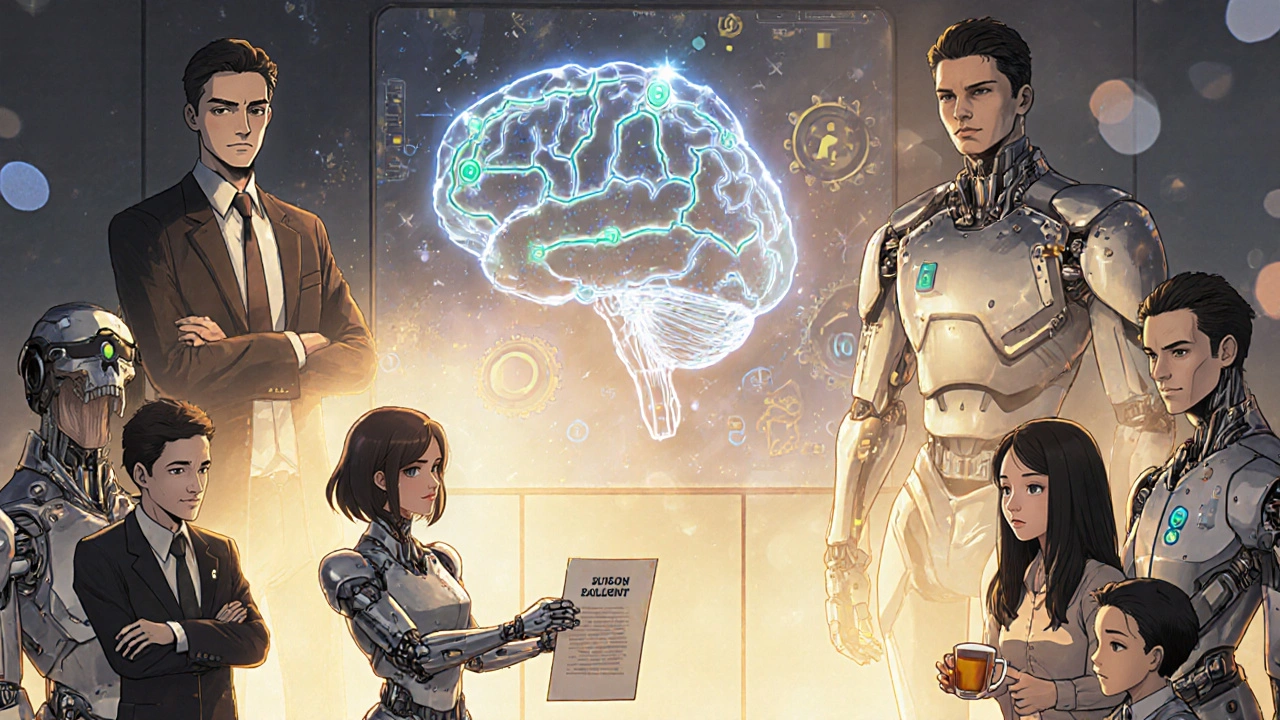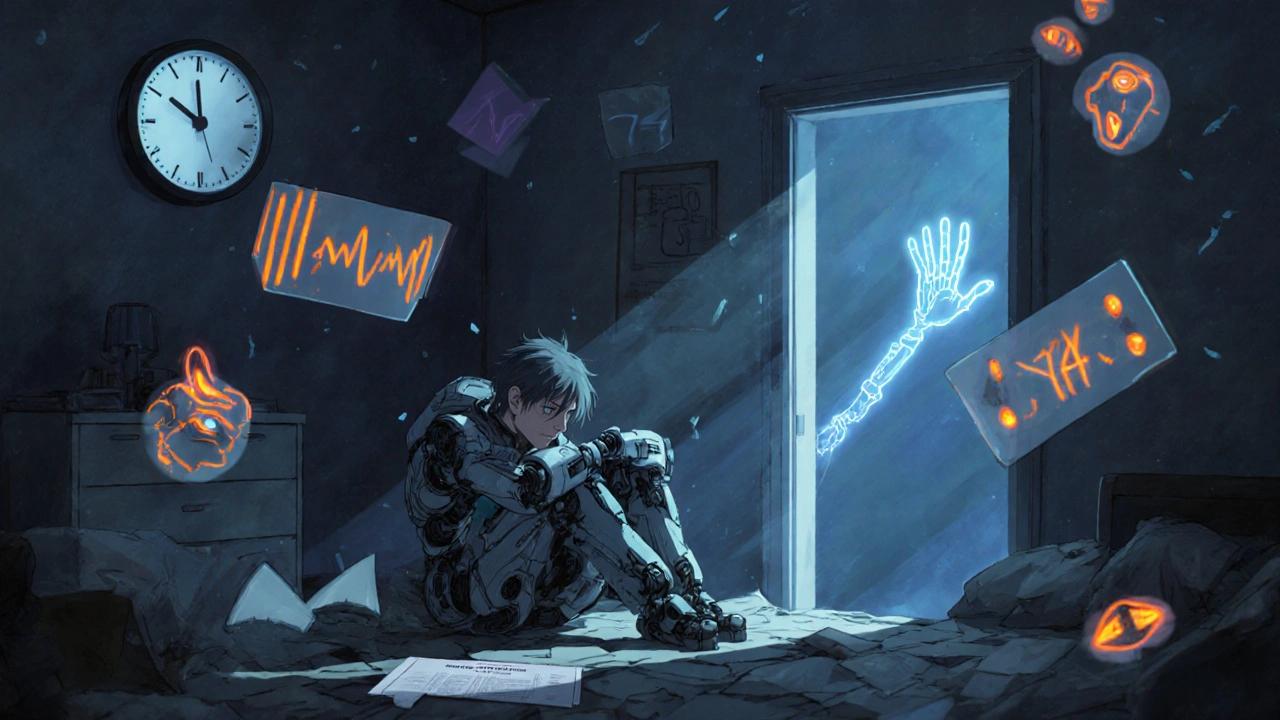When someone starts hearing voices that aren’t there, or becomes convinced that strangers are watching them, it’s not just paranoia-it could be the early stages of psychosis. Many people don’t realize these symptoms are warning signs, not just "being odd" or "going through a phase." By the time families get help, months or even years may have passed. But here’s the truth: psychosis is treatable, especially when caught early. And there’s a proven way to help-Coordinated Specialty Care.
What psychosis really looks like in the beginning
Psychosis isn’t a diagnosis. It’s a symptom. It shows up in conditions like schizophrenia, bipolar disorder, or even after extreme stress or drug use. But before full-blown hallucinations or delusions take over, there’s a quieter, longer phase. This is the prodromal stage-and it’s where intervention makes the biggest difference. Early signs are subtle. They don’t come with a siren. You might notice a once-top student suddenly struggling to finish homework. Or a friend who used to love hanging out now spends all day in their room. Maybe they start talking in odd ways-jumping from topic to topic, or using words that don’t fit. They might seem overly suspicious, convinced that a song on the radio is sending them secret messages. Research shows that in 85% of first-episode cases, people report trouble thinking clearly. In 78%, there’s a noticeable drop in school or job performance. Around 71% withdraw from friends and family. Poor hygiene? That happens in over half. These aren’t signs of laziness. They’re red flags. Some people describe feeling like the world is too bright, too loud. A rustling leaf might feel like a threat. A stranger’s glance might feel personal. They might laugh at nothing, or show no emotion when something sad happens. And here’s the most important part: at first, many know these experiences aren’t real. But over time, that awareness fades. That’s why waiting is dangerous.Why timing matters more than you think
The longer psychosis goes untreated, the harder it is to recover. Studies show the average person in the U.S. goes 74 weeks-nearly two years-without proper care after symptoms start. Each extra month without treatment increases recovery time by 5-7%. For young people, that means missing out on college, jobs, relationships. It means falling further behind. Dr. Lisa Dixon from Columbia University says it plainly: untreated psychosis doesn’t just linger-it rewires the brain. The longer the brain is exposed to uncontrolled symptoms, the more it adapts to them. That makes recovery slower, harder, and less complete. But here’s the good news: catching it early changes everything. When help comes within the first 12-24 months, recovery rates jump by 60% compared to waiting. That’s not a small gain. That’s life-changing.What is Coordinated Specialty Care (CSC)?
Coordinated Specialty Care isn’t just another therapy. It’s a full team approach designed for one thing: helping someone recover after their first episode of psychosis. It’s not one-size-fits-all. It’s built around five key parts, all working together. First, case management. A case manager visits you at home, not just in an office. They help with housing, transportation, appointments. They’re your guide through the system. The ratio is 1:10-meaning each staff member has time to really know their clients. Second, family education. Families aren’t bystanders. They’re part of the team. In CSC, they get 12-20 weekly sessions over six months or more. They learn what psychosis is, how to respond without panic, and how to support without enabling. That reduces conflict and increases stability. Third, individual therapy-specifically Cognitive Behavioral Therapy for psychosis (CBTp). This isn’t just talking. It’s learning how to challenge strange thoughts without fighting them. You learn to say, "This feels real, but it might not be," instead of "I’m losing my mind." Over 24-30 sessions, people gain control. Fourth, education and work support. If you used to be in college or had a job, CSC helps you get back. Eighty percent of participants start vocational training within three months. They don’t just get jobs-they get meaningful ones, with support. Fifth, medication management. Antipsychotics are used, but carefully. Doctors start at 25-50% of the usual adult dose. They don’t rush. They watch for side effects. The goal isn’t to numb you-it’s to reduce distress so you can re-engage with life.
How effective is CSC? The numbers don’t lie
The RAISE study, led by the National Institute of Mental Health, followed over 400 people for two years. Those in CSC programs improved 58% more in symptoms than those getting standard care. They were 35% more likely to stick with treatment. And 42% better at holding jobs or going to school. Hospital stays dropped by 45%. Emergency room visits fell. And for every dollar spent on CSC, society saved $17.50 in reduced crisis costs and increased productivity. It’s not magic. It’s structure. It’s consistency. It’s care that doesn’t give up on you.Where to go if you suspect psychosis
If you’re worried about yourself or someone else, don’t wait. Don’t hope it’ll pass. The "golden hour" rule exists for a reason: assessment within 72 hours of first concern gives the best shot at recovery. Start with a primary care doctor. Ask for a referral to an early psychosis clinic. If you’re in the U.S., look for a Coordinated Specialty Care program. There are 347 certified ones across 48 states. Some are in hospitals. Others are in community centers. You can find them through the SAMHSA website or by calling your state’s mental health department. Screening tools like the PQ-16 (Prodromal Questionnaire) are used by clinics to measure risk. A score of 8 or higher means a full evaluation is needed. Schools and colleges are starting to use these too. If you’re a student, talk to your counselor. They may have resources you didn’t know about.What’s changing in psychosis care
The field is moving fast. In 2023, the Early Psychosis Intervention Network (EPINET) launched to track outcomes across 200+ CSC programs. Early results show 63% of participants achieve symptom remission within a year. New research is looking at blood tests to predict psychosis before it happens. Twelve biomarkers have been identified with 82% accuracy. That’s not ready for clinics yet-but it’s coming. Digital tools are helping too. Apps for tracking mood and sleep are now used in 45% of CSC programs. Telepsychiatry helps people in rural areas. But there’s a catch: teens use these tools less than adults. So human connection still matters most. There’s still inequality. Black Americans wait 2.4 times longer than White Americans to get help. That’s why new studies are focusing on culturally tailored care.
What’s holding back progress?
Funding. Only 42% of people with first-episode psychosis get CSC within the critical two-year window. Why? Because many clinics don’t have enough staff. Or they rely on short-term grants. In rural areas, only 28% of counties have access. Urban areas? 84% do. Medicaid will require CSC services by 2025. That’s huge. It means more clinics can survive. But right now, 38% of programs worry they’ll shut down next year. And there’s fear. Some worry we’re overdiagnosing. Screening tools have a 30-40% false positive rate. That means some young people get labeled and medicated unnecessarily. Experts agree: we need better tools. But we can’t let perfect be the enemy of good. Waiting for certainty costs lives.You’re not alone
If you’re seeing these signs in someone you love, or in yourself, know this: you’re not failing. You’re not broken. You’re in the early stage of a treatable condition. And help exists. Psychosis doesn’t have to mean a lifetime of hospital stays or lost potential. With the right support at the right time, people go back to school. Get jobs. Fall in love. Build lives. The path isn’t easy. But it’s possible. And it starts with one step: reaching out.What are the first signs of psychosis?
Early signs include a drop in school or work performance, trouble concentrating, social withdrawal, unusual beliefs (like thinking messages are meant for you), hearing faint voices, increased sensitivity to light or sound, and changes in sleep or hygiene. These often start slowly and get worse over weeks or months.
Is psychosis the same as schizophrenia?
No. Psychosis is a symptom, not a diagnosis. Schizophrenia is one condition that can cause psychosis, but psychosis can also happen in bipolar disorder, severe depression, after drug use, or due to medical issues. Many people who have one episode of psychosis never develop schizophrenia.
How long does Coordinated Specialty Care last?
CSC typically lasts 2-3 years, with the most intensive support in the first 6-12 months. After that, care tapers off as the person gains stability. But support remains available if needed. The goal is to build independence, not lifelong dependency.
Can medication alone treat psychosis?
Medication helps reduce symptoms like hallucinations and delusions, but it doesn’t rebuild a life. People on medication alone are less likely to return to school, keep a job, or maintain relationships. CSC combines medication with therapy, family support, and work/school help-making recovery real and lasting.
What if I’m not sure whether it’s psychosis or just stress?
You don’t need to be sure. If you’re concerned, get an evaluation. Early psychosis clinics are trained to tell the difference. Stress can cause similar symptoms, but only a professional can determine if it’s part of a psychotic disorder. Better to check early than wait and risk delay.
Is Coordinated Specialty Care available everywhere?
Not yet. As of 2025, 347 CSC programs operate in the U.S., mostly in cities. Rural areas have limited access. But Medicaid will require these services by 2025, and new funding is expanding programs. Call your state’s mental health hotline to find the nearest option.
Can someone fully recover from psychosis?
Yes. With early intervention through Coordinated Specialty Care, up to 63% of people achieve symptom remission within a year. Many return to school, work, and independent living. Recovery doesn’t mean never having symptoms again-it means having the tools to manage them and live a full life.
What should I do if someone refuses help?
Don’t force it. Instead, stay connected. Keep talking without judgment. Offer to go with them to a doctor. Share information quietly. Sometimes, just knowing someone cares makes the difference. Crisis lines and early psychosis teams can also guide you on how to approach someone who’s resistant.

13 Comments
Erika Hunt
Okay, I just read this through twice, and I’m still sitting here with my coffee going… wow. I didn’t realize how many subtle signs there are-like when my cousin stopped showering regularly and started muttering about the TV whispering to her, we thought it was just stress from her breakup. But now I see it wasn’t laziness, it was the prodromal phase. The part about the brain rewiring? That hit me hard. I’ve always thought mental health was about willpower, but this? This is biology. And the fact that CSC reduces hospital stays by 45%? That’s not just numbers-that’s people keeping their jobs, their apartments, their dignity. I’m going to share this with my sister who works in ER. She needs to see this.
Sharley Agarwal
Too late. They always wait too long.
prasad gaude
In India, we call this ‘atma ka bhram’-the soul’s illusion. But we don’t treat it. We lock them away, or worse, take them to godmen who chant over them for days. This article? It’s a lifeline. CSC isn’t just treatment-it’s dignity. Imagine a young man who loved poetry, now silenced by voices, but given a therapist who listens, a job coach who believes, a family taught to hold space without fear. That’s not medicine. That’s resurrection.
Jennifer Griffith
ok but like… are we sure this isn’t just millennials being extra? i feel like everyone’s ‘hearing voices’ now bc of tiktok and anxiety. also why is everyone so obsessed with meds? maybe they just need to go outside more??
Patricia McElhinney
While I appreciate the sentiment expressed herein, I must emphasize the statistical fallacies embedded within the RAISE study’s methodology. The sample size, while nominally adequate, fails to account for socioeconomic confounders, particularly in urban versus rural cohorts. Moreover, the assertion that ‘every dollar spent yields $17.50 in savings’ is derived from a cost-avoidance model that discounts long-term institutionalization rates and ignores the latent effects of polypharmacy. This is not science-it is advocacy dressed in data.
Rachel Villegas
I work in a high school and we just got trained on the PQ-16 screening tool last month. One kid scored an 11. We referred him immediately. He’s in CSC now. He’s back in class. He’s writing poetry again. I didn’t know what to do before. Now I do. Thank you for laying this out so clearly.
Aki Jones
Let’s be real-this isn’t about psychosis. It’s about the pharmaceutical-industrial complex expanding its reach into adolescence. They’re pathologizing normal teenage weirdness. ‘Hearing faint voices’? That’s called imagination. ‘Withdrawal’? That’s called needing space. They’re medicating kids into compliance. And don’t get me started on the ‘biomarkers’-they’re just looking for excuses to label kids before they even have a chance. This isn’t care. It’s control. They want you to believe you’re broken so you’ll take the pill. Don’t fall for it.
Jefriady Dahri
Bro, this is the most hope I’ve felt in months. My little brother had his first episode last year. We didn’t know what to do. We thought he was just being dramatic. But we found a CSC center near Pune. Now he’s back in college. He still gets anxious sometimes, but he says the case manager is like his anchor. I cried when I read about the 63% remission rate. We didn’t give up. And neither should you. 🙏
Timothy Sadleir
It’s ironic, isn’t it? We live in an age of hyper-connectivity, yet we’ve created a system where people suffering from isolation are left alone for two years before anyone intervenes. We have algorithms that know what you want to buy before you do-but we can’t detect a child slipping into psychosis until they’re screaming at the mirror. The real tragedy isn’t the illness-it’s our collective apathy. We treat mental health like a luxury, not a human right.
Dolapo Eniola
Why is this only talked about in America? In Nigeria, we have our own ways. We pray. We fast. We take herbs. We don’t need your Western clinics with their white coats and pills. You think you’re helping? You’re erasing our culture. This is spiritual, not medical. Stop forcing your ideas on us.
Agastya Shukla
Interesting that the article mentions biomarkers with 82% accuracy but doesn’t discuss the ethical implications of predictive psychiatry. If we can identify psychosis before onset, do we have the right to intervene in asymptomatic individuals? What about autonomy? The line between prevention and coercion is thinning. We need public discourse, not just clinical protocols.
Josh Zubkoff
Let me just say this: I used to be a case manager for a CSC program in Ohio. I saw the good. I saw the bad. I saw the ones who got better. And I saw the ones who didn’t-because their parents refused meds, or the funding got cut after six months, or they got kicked out of housing because their ‘behavior was too disruptive.’ This article is nice, but it’s sugarcoated. The system is broken. It’s underfunded, overworked, and full of bureaucrats who care more about paperwork than people. Yes, CSC works-but only if you’re lucky enough to live near one, and only if you don’t fall through the cracks. And most do.
Leisha Haynes
So let me get this straight-you’re telling me if my kid starts avoiding friends and listening to music too loud, I should rush to a clinic instead of just telling them to get off their phone? Sounds like we’re turning normal teenage behavior into a medical emergency. Next thing you know, we’ll be diagnosing ‘prodromal procrastination’ and prescribing mood stabilizers for missed curfews